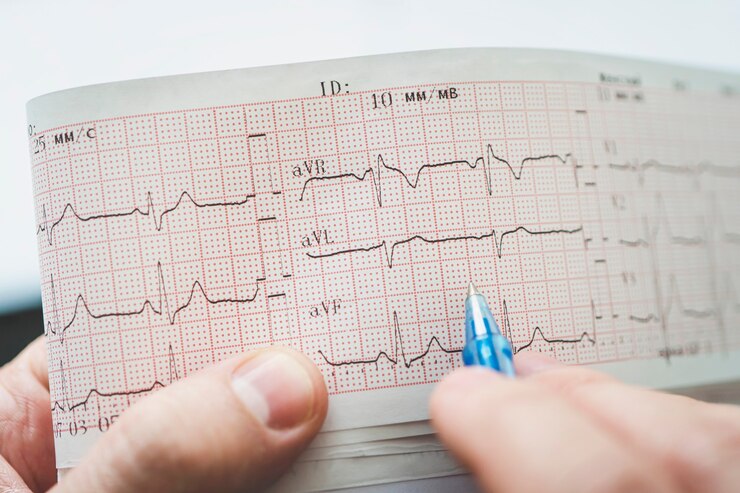
Tue, May 13, 2025 1:29 PM
What Is an ECG and Why Should You Care?
Let’s face it — we don’t think much about our heart unless something feels off. But when it comes to heart health, early detection can be life-saving. That’s where an ECG (electrocardiogram) steps in.
An ECG is a simple, painless test that records your heart’s electrical activity. It helps doctors detect irregularities that could signal heart problems before symptoms even show up.
How Does an ECG Work?
Think of your heart as an orchestra. Each beat is a perfectly timed note. The ECG is the device that "listens" and records those notes. It uses small electrodes placed on your chest, arms, and legs to measure electrical signals.
Types of ECG Tests
Not all ECGs are created equal. Depending on what your doctor suspects, they may order different versions:
-
Resting ECG: You lie still while the machine records your heart rhythm.
-
Stress ECG: Done while you're exercising to check how your heart performs under pressure.
-
Holter Monitor: A portable device you wear for 24-48 hours to catch irregularities throughout your day.
Who Should Get an ECG?
1. People With Heart Symptoms
If you're experiencing chest pain, palpitations, shortness of breath, dizziness, or fainting spells, an ECG is usually one of the first tests your doctor will order.
2. Individuals With a Family History of Heart Disease
Heart conditions often run in families. If your parents or siblings had heart disease, especially at a young age, getting an ECG could be a smart preventive move.
3. People With High-Risk Conditions
Have high blood pressure, diabetes, or are overweight? These conditions increase the risk of heart issues. An ECG can serve as a preventive screening.
4. Athletes and Physically Active Individuals
Intense physical activity puts extra stress on the heart. Many sports organizations now recommend ECG screenings before participation to rule out hidden cardiac abnormalities.
5. Before Major Surgeries
Doctors often require an ECG as part of pre-surgery testing, especially if anesthesia will be used.
6. People Taking Certain Medications
Some medications — like those for ADHD, depression, or blood pressure — can affect heart rhythms. Regular ECGs ensure you're safe while taking them.
Why ECGs Matter for Early Detection
One of the biggest benefits of ECGs? They catch issues before they become emergencies.
They help diagnose:
-
Silent heart attacks
-
Irregular rhythms (arrhythmias)
-
Blocked arteries
-
Congenital heart defects
ECGs for Different Age Groups
-
Children: Sometimes used if a child faints or has a known congenital issue.
-
Middle-aged adults: Routine if you're at risk or have symptoms.
-
Seniors: Part of regular cardiac monitoring.
ECGs in Emergency Situations
If someone has symptoms of a heart attack, the first thing paramedics or ER staff will do is hook them up to an ECG. It's fast, effective, and saves lives.
How Often Should You Get an ECG?
There’s no one-size-fits-all answer. However:
-
If you're healthy, once every few years might be fine.
-
If you’re at risk or showing symptoms, your doctor may recommend annual ECGs or even more frequent testing.
What to Expect During an ECG Test
The good news? It’s quick and painless.
-
Prep: You may be asked to avoid caffeine or exercise.
-
Procedure: Electrodes will be attached to your body, and you’ll lie still for a few minutes.
-
Duration: Usually takes 5–10 minutes.
Understanding Your ECG Results
-
Normal: Your heart is working just fine.
-
Abnormal: Doesn’t always mean something serious, but may require further tests.
Cost and Insurance for ECGs
Most insurance plans cover ECGs, especially if they’re ordered due to symptoms or as a preventive test for high-risk patients.
Where to Get an ECG Safely
Your best bet is a reputable clinic, cardiologist’s office, or hospital. Always follow surgical instructions from professionals to ensure accurate results and safe care.
If you’re also exploring other procedures related to sleep or health, this overview of available procedures offers insight into what clinics like Oral Facial Surgery Miami provide.
For those specifically concerned with breathing or sleep disturbances, you might want to review this page about sleep apnea treatment options — another area where ECGs may come into play in assessing the risk of cardiac issues tied to poor sleep quality.
Conclusion
An ECG isn’t just a tool for those already battling heart disease. It’s an essential diagnostic and preventive resource for anyone who wants to stay ahead of their health.
Whether you're symptom-free but at risk, or currently managing a condition, knowing when to get an ECG could make all the difference.